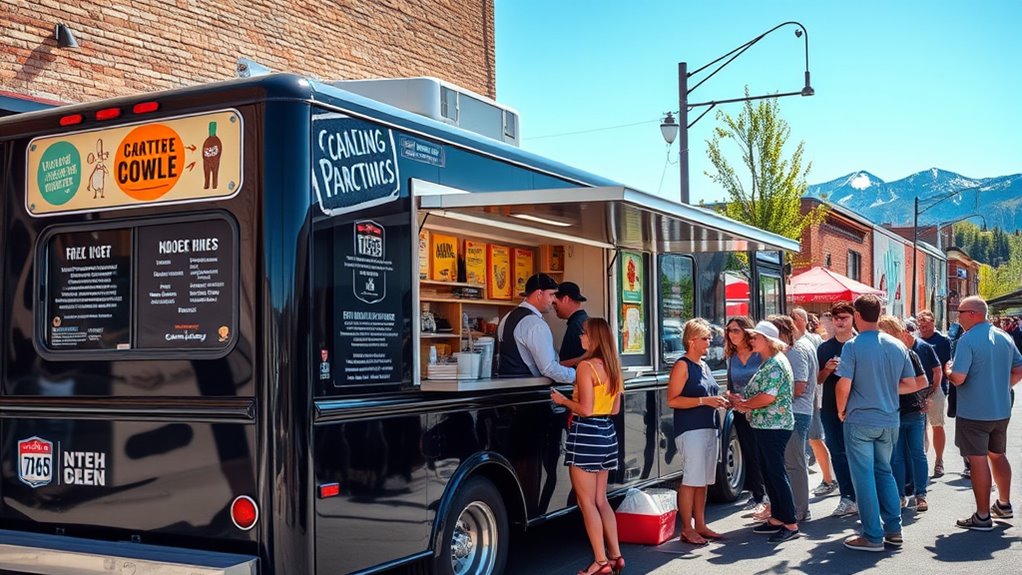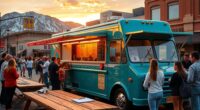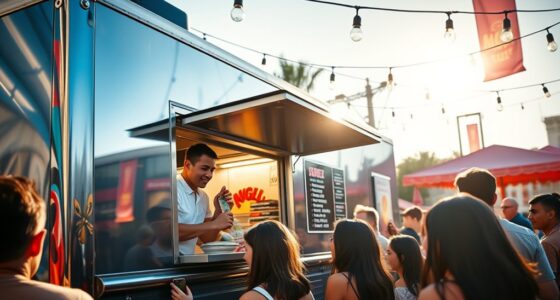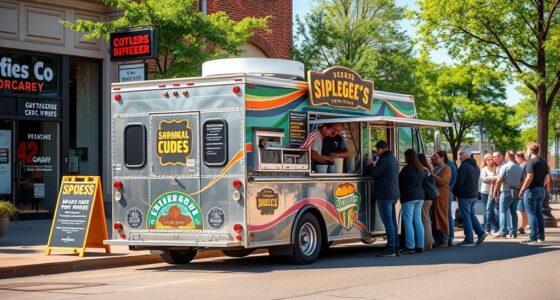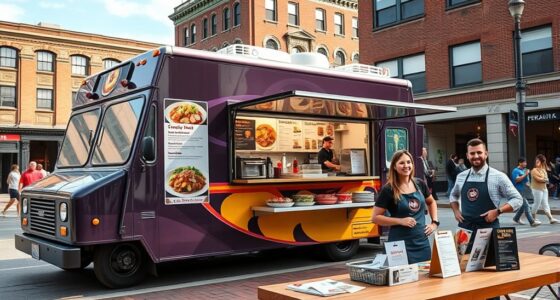To open a food truck in Missoula, Montana, you’ll need permits like a State Food Purveyors License, local health approvals, and an itinerant vendor license, with costs between $200 and $800. Choose high-traffic spots, follow zoning rules, and participate in community events for visibility. Plan your menu carefully and prioritize food safety. If you want to learn more about steering through permits, costs, locations, menu ideas, and marketing strategies, you’re in the right spot.
Key Takeaways
- Obtain necessary permits including food service, vendor licenses, and health department approval, ensuring compliance with zoning and fire safety regulations.
- Budget for startup costs such as custom truck ($50,000+), permits ($200-$600), equipment, and plan for ongoing expenses.
- Select high-traffic locations like downtown Missoula and community events, and utilize social media for marketing and real-time location updates.
- Develop a consistent, appealing menu that meets health standards, sources ingredients from approved suppliers, and leverages seasonal offerings.
- Engage with community events, festivals, and online platforms to build brand recognition, foster customer loyalty, and grow your business presence.
Understanding Necessary Permits and Licensing Requirements
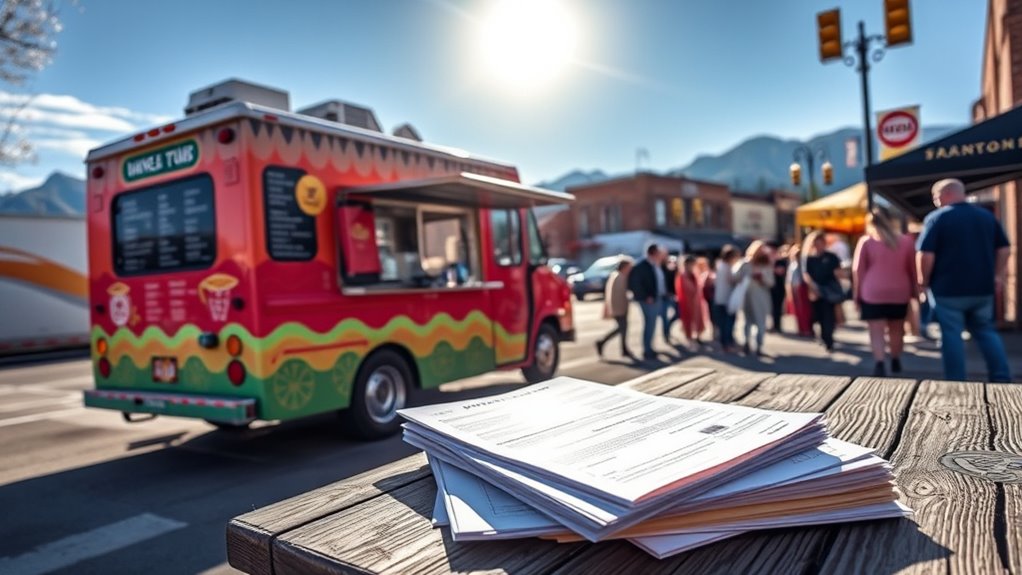
To operate a food truck in Missoula, you need to obtain several permits and licenses before hitting the streets. First, you must secure a State Food Purveyors License and any local permits required for serving food or beverages to the public, even if it’s free. Certain exceptions apply, like non-profits serving food less than four days annually or prepackaged non-refrigerated items. You’ll also need an Itinerant Vendor Business License from CPDI, which involves background checks and adherence to city rules on vending locations, times, and spacing. Before opening, a health department plan review and inspection are mandatory to guarantee your truck meets sanitation and safety standards. Additionally, your servicing area must be approved, equipped properly, and compliant with food code regulations. Understanding food safety regulations is essential to ensure compliance and avoid potential penalties.
Estimating Costs and Fees for Your Food Truck Business
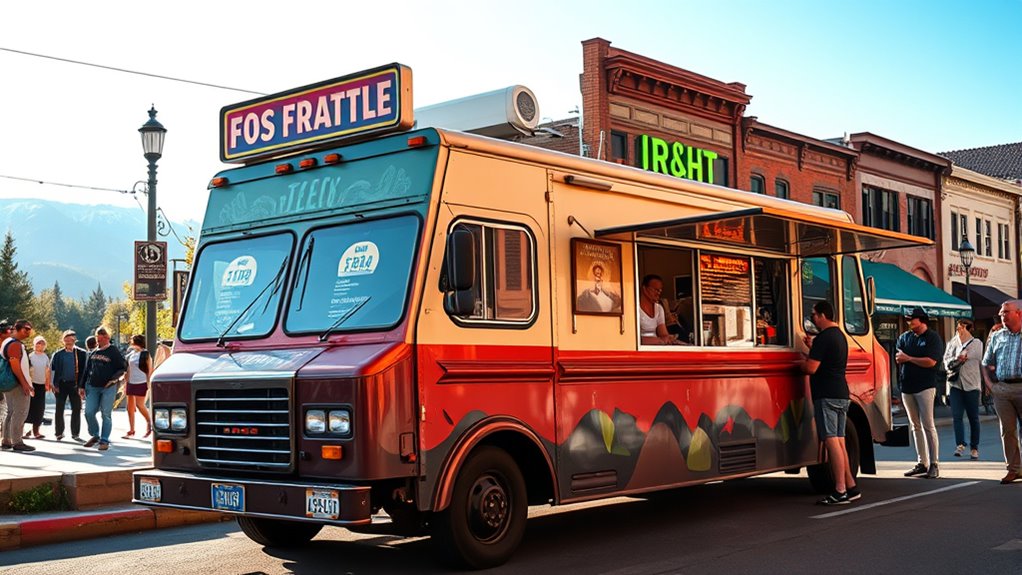
Understanding your costs is essential to launching a successful food truck in Missoula. You’ll need to contemplate licensing, permits, and the expenses for outfitting your truck with necessary equipment. By estimating these fees upfront, you can create a realistic budget to keep your business on track. Additionally, considering the startup costs for purchasing or leasing your truck and ongoing expenses such as insurance and marketing will help you develop a comprehensive financial plan. Incorporating the design and layout of your truck can also impact costs and efficiency in operation.
Licensing and Permit Fees
Estimating the costs for licensing and permits is a crucial step in launching your food truck business in Missoula. Mobile food permit fees typically range from $200 to $600, depending on location and city department requirements. A food service license is mandatory, with costs between $200 and $800 based on risk and equipment. You’ll also need a Business License, which can vary from $49 to over $196 depending on gross receipts and business type. Health department inspections and certifications, such as food safety training, may add extra fees, usually around $145 for HACCP review. Additionally, you might need special permits like temporary food permits ($35–$105), and possibly zoning or parking approvals, all contributing to your total licensing costs.
Equipment and Facility Costs
Starting your food truck business in Missoula requires a clear understanding of equipment and facility costs, which can vary widely based on your choices. New custom trucks range from $50,000 to over $150,000, depending on size and equipment. Golden State Trailers offers high-quality, fully customized food trailers that can be designed to fit your specific business needs and budget. When budgeting, consider the importance of strategic planning to ensure all necessary costs are accounted for to prevent surprises down the line. Used trucks can markedly cut costs, with prices varying based on condition and included features. Kitchen equipment like refrigerators, grills, and sinks typically costs several thousand dollars, with used options available for savings. Facility modifications, such as ventilation and water systems, can range from $10,000 to $50,000, depending on customization needs. Additional costs include POS systems, utensils, and safety equipment. Planning ahead helps you budget effectively for your mobile kitchen startup.
Identifying Approved Locations and Zoning Regulations
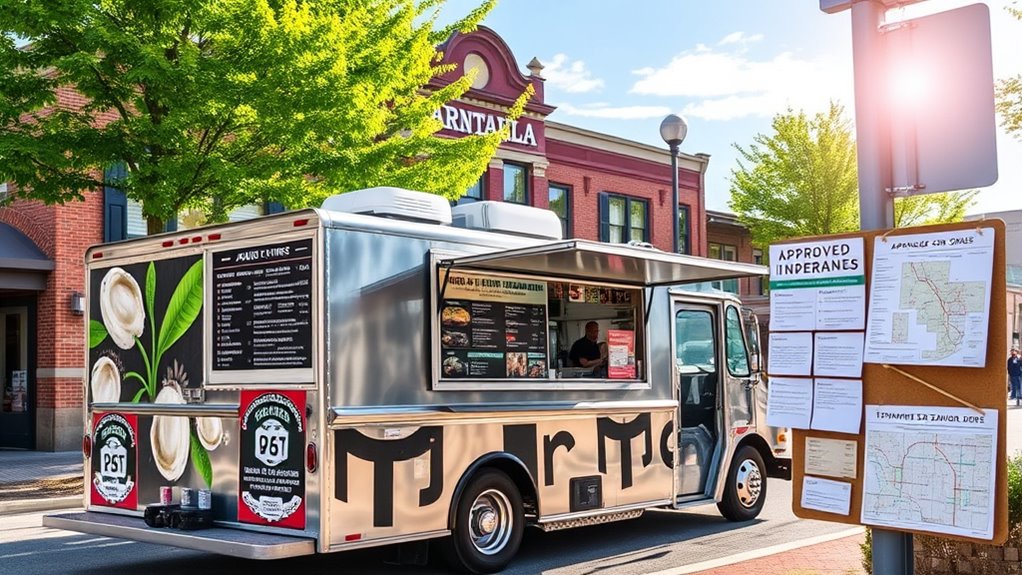
To operate a food truck in Missoula, you need to identify approved locations that comply with city zoning and public right-of-way regulations. You can’t set up near fire hydrants, block sidewalks, or obstruct pedestrian passage. Also, keep at least 10 feet away from business entrances or window displays unless you get permission. Equipment must be removed by 9 p.m. daily to avoid conflicts.
| Location Restrictions | Applicable Zoning Areas |
|---|---|
| No vending within 15 feet of fire hydrants | Business (B) and Commercial (C) zones |
| No setup within 10 feet of entrances | Residential districts with setbacks |
| No vending during farmers markets | Specific public property restrictions |
Planning Your Menu and Ensuring Food Safety Standards
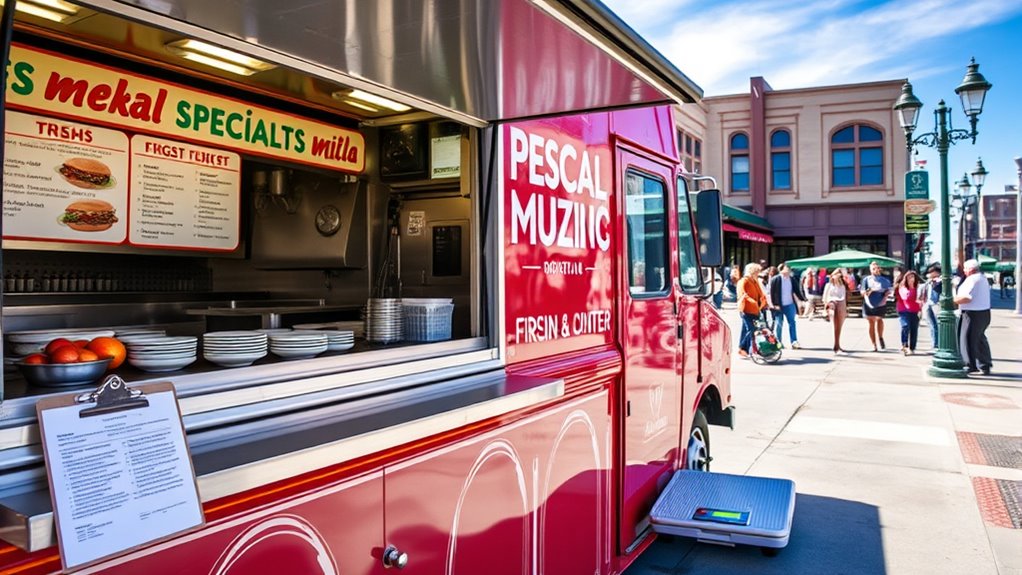
Planning your menu carefully is essential to meet health department standards and guarantee smooth operations. First, submit a detailed menu for plan review, listing all foods and beverages to guarantee compliance. Second, choose menu items suited for limited truck space and avoid high-risk foods that require extensive temperature control. Third, source ingredients from approved suppliers and plan storage like refrigeration or dry storage to maintain safety. Fourth, keep your menu consistent over time to reduce plan resubmissions and streamline approval. Additionally, ensure proper food safety practices by installing accessible handwashing stations, using sanitizers, and maintaining correct food temperatures (cold ≤41°F, hot ≥135°F). Follow hygiene protocols, segregate utensils, and plan your equipment layout to support safe food prep and storage. Incorporating food safety standards into your menu planning helps ensure compliance and protects your customers.
Developing Effective Marketing Strategies for Your Food Truck
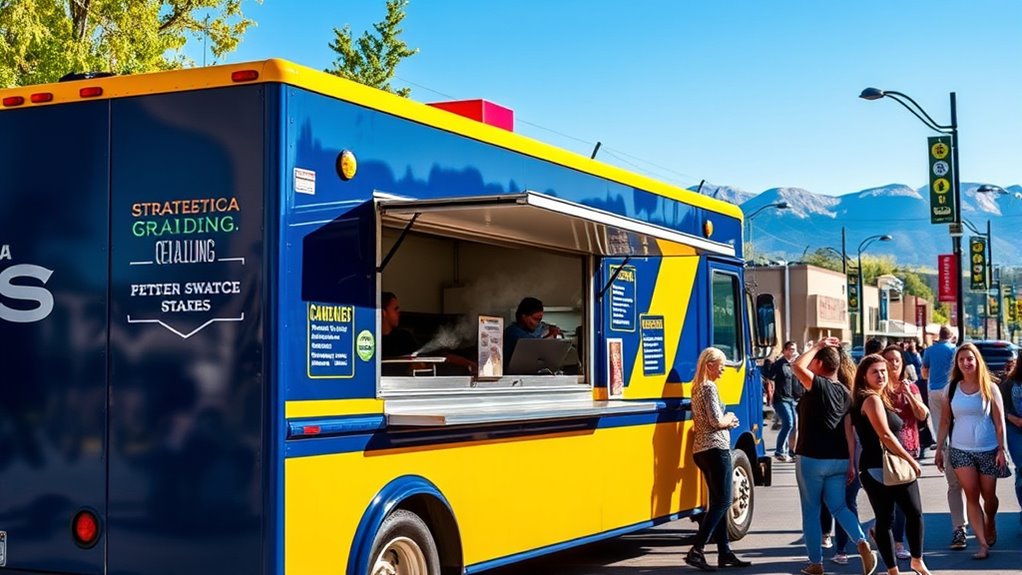
Participating in local events and festivals is a powerful way to boost your food truck’s visibility and attract new customers. Pairing this with active social media engagement helps you reach a broader audience and keep loyal fans informed. Together, these strategies create a strong presence both online and in your community, driving sustained growth. 80% of food trucks participate in at least 3 festivals or events annually and leveraging these opportunities can significantly enhance your brand recognition and customer base. Additionally, understanding sugar content in popular treats can help you incorporate healthier options into your menu, appealing to health-conscious patrons.
Local Event Participation
Engaging in local events offers a powerful way to boost your food truck’s visibility and connect directly with the community. Participating in events like Downtown ToNight and Out to Lunch puts your truck in front of diverse crowds, from families to professionals. Here’s how to make the most of these opportunities:
- Focus on events with strong attendance and sponsorships to maximize exposure.
- Choose dates that align with your target audience and avoid oversaturation.
- Select events matching your cuisine style to attract relevant customers.
- Get involved in charity festivals or art fairs to build community relationships.
- Remember that the 24th season of Downtown ToNight begins on June 5, 2025, and features weekly performances and activities that attract large crowds, making it an ideal opportunity for exposure. Downtown ToNight
- It’s also beneficial to develop community connections by engaging with local organizations and residents, which can lead to ongoing support and loyalty.
Ensure you plan logistics carefully, streamline your menu, and meet all permits and health requirements. These strategies will help your food truck stand out and foster lasting community connections.
Social Media Engagement
Effective social media engagement can considerably boost your food truck’s visibility and attract loyal customers. Focus on platforms where your target audience is most active. Use Instagram for eye-catching food photos, behind-the-scenes shots, and reels with trending audio to showcase your menu and personality. Facebook helps you reach a broader community with promotions, event updates, and customer interactions. Twitter is ideal for real-time updates like location changes or menu items, while TikTok’s short videos can go viral with creative cooking demos. Develop a consistent content calendar mixing high-quality images, specials, and behind-the-scenes content. Respond promptly to comments and reviews, and encourage user-generated content through fan features or contests. Use hashtags, location tags, and sponsored ads to increase your reach and build a loyal online community. Necessary cookies enable basic site features, ensuring your customers can easily find and interact with your online presence.
Navigating Operational Compliance and Inspection Processes
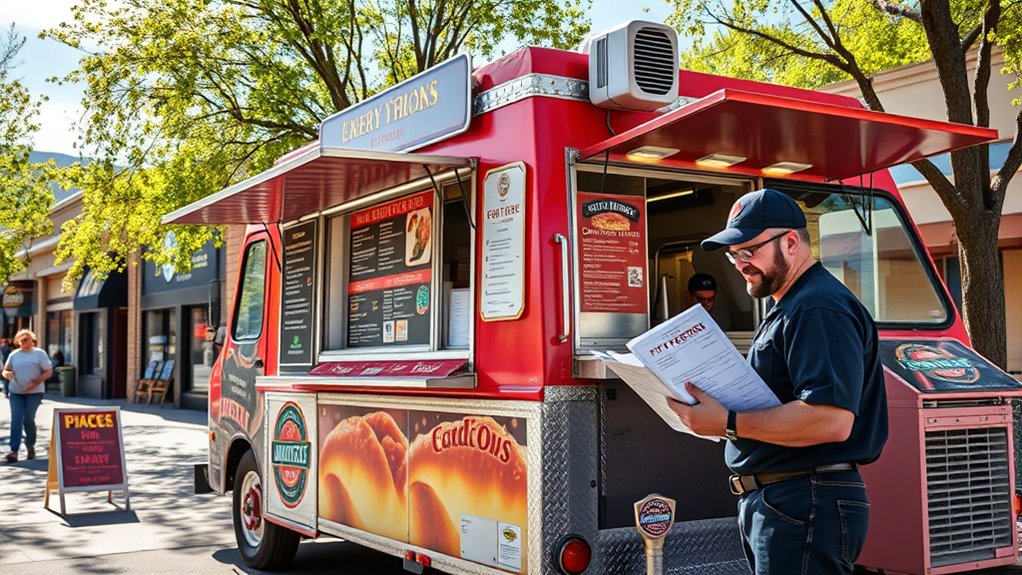
Understanding the operational compliance and inspection processes for food trucks in Missoula requires understanding and adhering to several key regulations. First, you must obtain an itinerant vendor license from the city and a food service license from the County Health Department, which involves submitting detailed plans and menus. Second, health inspections are unannounced and focus on food safety standards, including storage, sanitation, and proper facilities. Third, you need to comply with fire safety rules, such as maintaining at least 10 feet clearance, avoiding obstructions, and using approved fire extinguishing systems for appliances like propane. Fourth, managing waste effectively and following environmental health regulations is essential. Additionally, projector technology effects, such as contrast ratio and color accuracy, can influence the overall presentation of visual content in your setup. Staying compliant ensures smooth operation and helps you avoid violations and penalties.
Tips for Successful Launch and Ongoing Business Growth
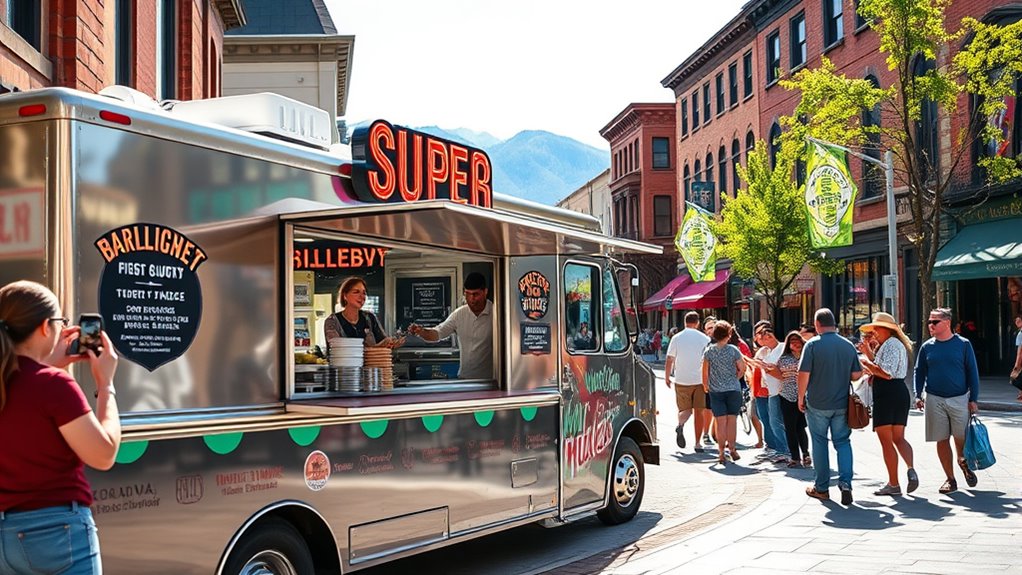
Launching a food truck successfully and sustaining business growth requires careful planning and strategic execution. First, develop a unique, consistent concept with strong branding—logo, colors, and design—that stand out in Missoula. Focus on a niche or cuisine that fills a local gap, and use seasonal offerings to keep your menu fresh. Optimize your menu by analyzing sales data, removing slow movers, and using versatile ingredients to cut costs. Expand your reach with online ordering, catering, and participating in high-traffic events. Manage operations efficiently by forecasting staffing needs, training employees, and maintaining your truck. Build customer loyalty through active social media engagement and encouraging feedback. This strategic approach helps you launch effectively and sustain long-term growth in Missoula’s competitive food scene. Additionally, understanding local regulations and staying informed about industry trends can provide a competitive edge and ensure compliance. Incorporating space and organization strategies can also improve your workflow and customer experience, making your business more efficient and adaptable.
Frequently Asked Questions
How Long Does the Licensing Process Typically Take in Missoula?
The licensing process in Missoula typically takes between 30 to 60 days, depending on how complete and clear your application is. If you submit a thorough application with all required documents early, it can be completed in a shorter time. Be sure to stay responsive and communicate quickly with reviewers, especially if there are any delays or needed clarifications, to help speed up the process.
Are There Any Specific Health Department Requirements for Outdoor Food Prep Areas?
Think of outdoor food prep areas as the heart of your operation — they need to beat with safety and compliance. You must obtain permits, ensure proper handwashing facilities, and shield food from environmental hazards. Your setup should stay at least 10 feet from buildings and flammable materials, and fire safety standards must be met. Regular inspections and documentation keep your outdoor kitchen thriving within Missoula’s health department guidelines.
Can I Operate My Food Truck Year-Round in Missoula’S Climate?
You can operate your food truck year-round in Missoula, but you need to plan carefully. Winters bring cold temperatures, snow, and limited outdoor activity, so you’ll require winterized equipment like heaters and insulation. Make sure you have the proper licenses, such as a permanent mobile food establishment license, and comply with health and safety regulations. Adjust your locations, menu, and marketing strategies to suit seasonal changes and guarantee safe, consistent service throughout the year.
What Are the Penalties for Operating Without the Proper Permits?
You risk serious penalties if you operate your food truck without proper permits. Montana law classifies this as a misdemeanor, with fines starting at $50 and increasing for repeat offenses. You could also face jail time, especially after multiple violations. Civil penalties up to $500 may also be imposed. Additionally, operating unpermitted can lead to closure, damage your reputation, and prevent you from legally selling at key locations or events.
How Do I Find Available Parking Spaces for Street Vending in the City?
Finding vending parking spots is like solving a puzzle—you need the right pieces in the right places. Start by reaching out to the Missoula Parking Commission for maps and guidance, and check city resources like the Itinerant Vendor Guide. Confirm with local officials about permitted zones, and visit municipal lots for off-street options. Staying informed guarantees you secure legal, accessible spots that keep your vending business running smoothly.
Conclusion
Starting your food truck in Missoula can be rewarding if you follow the right steps. For example, imagine launching a taco truck that gains popularity at local events, thanks to proper permits, a tempting menu, and strategic marketing. Keep up with regulations, choose prime locations, and connect with your community. With dedication and smart planning, your food truck can become a beloved part of Missoula’s vibrant food scene, paving the way for ongoing success.
